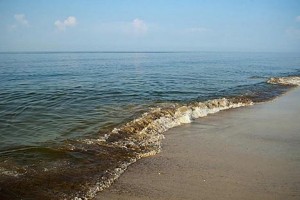White House Greenlights Arctic Drilling As Congress Sends Billions To Restore Gulf Coast
 As soon as today, Congress and the White House could issue decisions with massive and opposing ramifications for oceans in distant corners of our country.
As soon as today, Congress and the White House could issue decisions with massive and opposing ramifications for oceans in distant corners of our country.The House and Senate are expected to pass a sweeping Transportation bill including a provision to send badly needed dollars to the Gulf Coast that will help communities and ecosystems recover from BP’s Deepwater Horizon spill. The money would comprise 80 percent of the civil fines BP and other responsible parties will have to pay as a result of the 2010 catastrophe, a measure recommended in the CAP-Oxfam report “Beyond Recovery.”
Meanwhile, the Department of Interior is on the cusp of issuing permits for Shell for drilling new oil wells in the Arctic Ocean’s Beaufort and Chukchi Seas off the north slope of Alaska. The administration’s justification? As Secretary Salazar stated earlier this week, “I believe there will not be an oil spill.”
The irony of these two actions occurring almost simultaneously proves we are still more inclined to mitigate future disasters than set up the rigorous safeguards that can help prevent them.
Giving Shell the permits needed to commence drilling in the Arctic—an area shown to have extremely limited infrastructure to respond to a potential spill, as detailed in the CAP report “Putting a Freeze on Arctic Ocean Drilling” — is a recipe for yet another disaster for local economies and the environment. The lack of response capabilities in the region becomes clearer when compared to the resources needed in the response to the Deepwater Horizon spill (view CAP’s map here).
So while we’re doling out billions to the Gulf to help mop up, we’re simultaneously setting ourselves up for the possibility of another failure in a region where we have virtually no resources for cleaning up a spill. Admiral Robert Papp, the commandant of the U.S. Coast Guard, explained the situation in a June 2011 Senate hearing:
“Our current Arctic capabilities are very limited…. Imagine if we had to mount a major pollution response—we would have to create our own infrastructure… Although private industry may assert they are adequately prepared for a response to a spill, we must determine what response capability our Coast Guard and Nation needs to have so we can mount an adequate response as exploration advances towards production.”
In addition to Admiral Papp’s warning, businesses have indicated their skittishness about investing in or insuring oil exploration in the region. German bank WestLB announced they would not provide financing to any offshore oil or gas drilling ventures in the area, declaring the “risks and costs are simply too high.” A week earlier, the insurance giant Lloyd’s of London concluded that offshore drilling in the Arctic would “constitute a unique and hard-to-manage risk” and advised companies to “think carefully about the consequences of action.”
With the nearest permanent Coast Guard facility over 1,000 miles away, no major roads, railroads, or ports along the North Slope, and extreme and unpredictable weather patterns, any coordinated response effort would be daunting.
Communities across Alabama, Florida, Louisiana, Mississippi and Texas — all too familiar with the economic and environmental price of insufficient response plans — are close to receiving badly needed funding to rebuild their economy and environment from fines paid by BP and other companies. The money, which could be as much as $16 billion, will then be invested in projects and activities that restore the long-term health of the Gulf Coast ecosystems and coastal economies.
Unfortunately, the transportation bill fails to address the strain put on government funds once the liability limit (or polluter’s ability to pay) has been reached. Though BP will not invoke the set $75 million liability cap for the Gulf disaster, Congress leaves the door open for other polluters to do so in the future, ignoring the Government Accountability Office’s 2007 and 2010 reports which both found “the liability limits for certain vessel types may be disproportionately low compared with their historic spill cost.”
At least now we know that there’s a precedent. If a spill wrecks the pristine Arctic and endangers the environment, culture, and very existence of the North Slope’s Alaska native communities, they may be first in line for a big payout to help clean up. Assuming we can ever figure out exactly how to do it.
You can return to the main Market News page, or press the Back button on your browser.

